|
|
|
Sort Order |
|
|
|
Items / Page
|
|
|
|
|
|
|
| Srl | Item |
| 1 |
ID:
108611
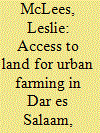

|
|
|
|
|
| Publication |
2011.
|
| Summary/Abstract |
People in sub-Saharan Africa rely on a variety of informal mechanisms to gain access to land for urban farming. However, the literature on land tenure focuses on gaining access to land for housing, whereas farming, which is highly visible in the urban landscape of Dar es Salaam, Tanzania, requires farmers to negotiate their access in ways distinct from housing. A close examination of four open-space farms in Dar es Salaam reveals that there are different methods of gaining access to land for farming as opposed to housing. Additionally, theorising this access reveals that the landowners who allow farmers on their land for food production also derive benefits. This can provide a framework for current efforts to integrate urban agriculture into the city zoning plans.
|
|
|
|
|
|
|
|
|
|
|
|
|
|
|
|
| 2 |
ID:
060835
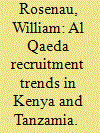

|
|
|
|
|
| Publication |
Jan-Feb 2005.
|
| Summary/Abstract |
At first glance, Kenya and Tanzania, the scene of some of Al Qaida's most impressive attacks, would appear to be fertile ground for recruiting militants into the global Islamist jihad. Substantial Muslim populations, widespread poverty, poor policing, inadequate border control, and systemic political and economic corruption would seem to make these East African countries potentially rich environments in which to attract new Al Qaida members. However, other factors essential to the terrorist recruitment process are largely absent. Despite claims that the traditionally tolerant Muslim populations of Kenya and Tanzania re being radicalized, the evidence suggests that Islamist radicals have in fact made little headway. Although individuals may have forged links with Al Qaida, Osama bin Laden and his network have few followers. Of course, this is subject to change. But in the near term, absent an environment of radicalism, as in a major recruitment ground like Pakistan, it is difficult to see how Al Qaida can expect to attract more than a handful of new members. That said, the United States could do far more in the region to prevent the emergence of violent Islamist extremism.
|
|
|
|
|
|
|
|
|
|
|
|
|
|
|
|
| 3 |
ID:
162622
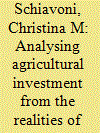

|
|
|
|
|
| Summary/Abstract |
Over the past decade, agricultural investment has been presented as a catchall solution to a converging set of global crises, often with poor rural communities as the proclaimed beneficiaries. Yet the promises of such investment, such as poverty alleviation and improved food access, are routinely at odds with realities on the ground. This article offers frameworks for analysis of agricultural investment that are grounded in the realities of small-scale food providers, drawing from two studies. The first study employs a right to food framework to identify the main channels through which food for consumption is procured by small-scale food providers and the factors impacting these channels. It draws on empirical data from within the Southern Agricultural Growth Corridor of Tanzania (SAGCOT), an investment model promised to lift rural communities out of poverty, which reflects a regional trend. Based on the shortcomings of the large-scale investments examined, the second study employs a food sovereignty framework to explore alternative forms of investment envisioned and/or already being put into practice by small-scale food providers in the SAGCOT area and elsewhere in Tanzania. While two different frameworks formed the basis of two different studies, both the studies and their frameworks are interrelated. The final section of this article makes the case for why both the right to food and food sovereignty are essential lenses for understanding agricultural investment vis-à-vis small-scale food providers and the ways in which they can serve as complementary tools for effective analysis.
|
|
|
|
|
|
|
|
|
|
|
|
|
|
|
|
| 4 |
ID:
145178
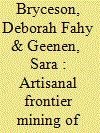

|
|
|
|
|
| Summary/Abstract |
This article studies the transformative nature of ‘artisanal frontier mining’ in view of sub-Saharan Africa's mining history. Artisanal gold production has generated livelihood earnings for millions of people in sub-Saharan Africa. Yet we must go beyond a study of artisanal mining as an individual livelihood choice and consider the sector's internal dynamics. In this sense, the concept of ‘labour transformation’ is helpful. It refers to a process in which individuals' skill acquisition, economic exchange, psychological reorientation, and social positioning evolve towards a shared occupational identity and collective professional norms, leaving considerable scope for self-governance amongst artisanal miners. This process is captured in the notion of the ‘frontier’, which in our case refers to occupational rather than geographic locational change. However, the frontier is necessarily of limited temporal duration given the existence of gold as a non-renewable resource, the depth of the gold supply sinking beyond the exploratory and extractive reach of artisanal miners, and the expanding interests of foreign mining corporations and the state. Our argument is illustrated through a comparison of the artisanal mining experiences of two neighbouring countries, Tanzania and the Democratic Republic of Congo (DRC), whose artisanal labour patterns are remarkably similar to each other despite their very different national political contexts and the DRC's recent experience of conflict mineral production.
|
|
|
|
|
|
|
|
|
|
|
|
|
|
|
|
| 5 |
ID:
170525
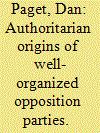

|
|
|
|
|
| Summary/Abstract |
This article concerns the organizational expansion undertaken by the opposition party, Chadema, in Tanzania between 2003 and 2015. It argues that Chadema’s extensive party-building enabled it to mobilize on the ground. These organizational developments, as much as elite action, underpinned recent changes in the party system and the opposition’s improved showing in recent elections. Chadema established branches even though many of the prerequisite circumstances typically recognized in the literature were absent. This makes Chadema a deviant case and this deviance has implications for the historical institutionalist literature on party-building. This article complicates Rachel Riedl’s account of state substitution. She links the incorporation or substitution of social actors to different paths of party system institutionalization. This article demonstrates that the character and consequences of state substitution depend upon the balance of power between state and social actors. It also builds on accounts by Adrienne LeBas and others that when social actors are strong, they can endow opposition parties with resources which make branch establishment possible, and when they are weak, they can only act as surrogate party branches. This article illustrates that when social actors are absent from partisan politics, parties have no way to organize except by founding green-site branches.
|
|
|
|
|
|
|
|
|
|
|
|
|
|
|
|
| 6 |
ID:
072837
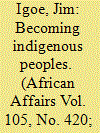

|
|
|
|
|
| Publication |
2006.
|
| Summary/Abstract |
Although the term 'indigenous' implies a state preceding that which is foreign or acquired, indigenous movements in Africa are a recent phenomenon. Drawing from the author's research of the Tanzanian indigenous peoples' movement in the 1990s, this article argues that indigenous identity in Tanzania does not represent miraculously preserved pre-colonial traditions or even a special sort of marginalization. Rather, it reflects the convergence of existing identity categories with shifting global structures of development and governance. Specifically, it reflects a combination of 'cultural distinctiveness' and effective strategies of extraversion in the context of economic and political liberalization. The Maasai, who are 'culturally distinct', and who have a long tradition of enrolling outsiders in their cause, naturally dominate this movement.
|
|
|
|
|
|
|
|
|
|
|
|
|
|
|
|
| 7 |
ID:
097209
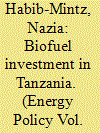

|
|
|
|
|
| Publication |
2010.
|
| Summary/Abstract |
Increasing demand for biofuels as a component of climate change mitigation, energy security, and a fossil fuel alternative attracts investors to developing countries like Tanzania. Ample unused land is critical for first generation biofuels production and an important feature to attract foreign direct investments that can contribute towards agricultural modernization and poverty reduction initiatives. Despite the economic justifications, the existing institutional and infrastructural capacities dictate the impacts of biofuels market penetrations. Furthermore, exogenous factors like global recessionary pressure depressed oil prices below the level at which biofuel production were profitable in 2007, making Tanzania's competitiveness and potential benefits questionable.
This paper investigates the extent that first generation, jatropha-based biofuels industry development in Tanzania observed during fieldwork in Kisarawe and Bahi may fulfill policy objectives. This paper argues that without strong regulatory frameworks for land, investment management, and rural development, biofuel industrialization could further exacerbate poverty and food insecurity in Tanzania. The paper concludes with policy recommendations for first generation biofuel development while keeping in mind implications of second generation production. Since the topic is broad and multifaceted, a multidisciplinary approach is used that includes political, institutional, and agricultural economics to analyze and conceptualize biofuel industry development and food security.
|
|
|
|
|
|
|
|
|
|
|
|
|
|
|
|
| 8 |
ID:
084756
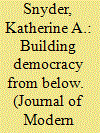

|
|
|
|
|
| Publication |
2008.
|
| Summary/Abstract |
Focusing on events in a rural village in Tanzania during 2001-02, this paper examines the changing nature of state/society relations in Tanzania. Drawing on experience from previous years of fieldwork in the early 1990s, it becomes apparent that villagers are beginning to change the way they engage with the state. These new approaches are framed in part by the discourse of democracy, with which Tanzanians have become familiar since the economic and political liberalisation policies of the 1990s. These events reveal a new sense of the right to participate in decision-making on how to use key development resources. They also illustrate how local elites can threaten to capture benefits for their own gain. As Tanzanians begin to demand more rights to participate in the public sphere, their achievements enlarge our understanding of what might constitute civil society.
|
|
|
|
|
|
|
|
|
|
|
|
|
|
|
|
| 9 |
ID:
126516
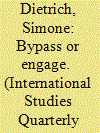

|
|
|
|
|
| Publication |
2013.
|
| Summary/Abstract |
The conventional wisdom in the literature on aid allocation suggests that donors utilize bilateral aid as a tool to buy influence in the aid-receiving country. Those who conclude that aid is driven by donor self-interest focus on government-to-government aid transfers. However, this approach overlooks important variation in delivery tactics: Bilateral donors frequently provide aid to nonstate actors. This paper argues that donors resort to delivery tactics that increase the likelihood of aid achieving its intended outcome. In poorly governed recipient countries, donors bypass recipient governments and deliver more aid through nonstate actors, all else equal. In recipient countries with higher governance quality, donors engage the government and give more aid through the government-to-government channel. Using OLS and Probit regressions, I find empirical support for this argument. Understanding the determinants of donor delivery tactics has important implications for assessing aid effectiveness.
|
|
|
|
|
|
|
|
|
|
|
|
|
|
|
|
| 10 |
ID:
107192
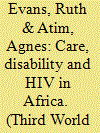

|
|
|
|
|
| Publication |
2011.
|
| Summary/Abstract |
Recent research and policy have recognised the central role of unpaid care-givers (often women and girls) in the global South. Disability rights perspectives, however, challenge the language of 'care' and 'dependence'. Drawing on qualitative research with women living with HIV and children caring for them in Tanzania, and on learning from the National Community of Women Living with HIV and AIDS in Uganda (NACWOLA), this paper explores the divergences and interconnections between the concepts and practices of care, disability and HIV in the context of East Africa. Despite the development of interdependent caring relations, both care-givers and people living with HIV in Tanzania experience 'diminished autonomy'. The participation of people living with HIV, including disabled people, in home-based care and in peer support groups, however, can enhance 'relational autonomy' for both care-givers and care-recipients. We reflect on opportunities and challenges for mutual learning and cross-movement advocacy by disabled people, people living with HIV and care-givers.
|
|
|
|
|
|
|
|
|
|
|
|
|
|
|
|
| 11 |
ID:
077967
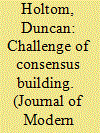

|
|
|
|
|
| Publication |
2007.
|
| Summary/Abstract |
As evidence of the failure of policy-based aid mounted in the early 1990s, a 'new aid agenda' developed. The agenda emphasised among other things, the importance of dialogue and partnership in order to help build ownership of more complex second-generation reforms. The Poverty Reduction Strategy Paper (PRSP) has developed as the key instrument for implementing this partnership in much of sub-Saharan Africa. However, this is not the only objective of the PRSP. Tanzania, at the forefront of attempts to restructure government-donor relations and one of the first countries to prepare a PRSP, illustrates the tensions created by the PRSP's complex genealogy and how these are being worked out in practice
|
|
|
|
|
|
|
|
|
|
|
|
|
|
|
|
| 12 |
ID:
146112
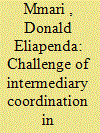

|
|
|
|
|
| Summary/Abstract |
Orthodox approaches to development view the market as a key institution for driving economic transformation and for fostering innovation and competitiveness. The working of markets alone, however, does not always lead to improved outcomes such as increase in productivity or production efficiency in the context of smallholders. The role of non-market institutions, therefore, remains important. This paper examines the role of intermediary coordination in addressing constraints to efficiency and productivity of smallholder sugarcane producers in Tanzania. It also makes a contrastive analysis of a different organisational arrangement for smallholder sugarcane producers in Malawi. The key proposition is that while intermediary organisations of cane outgrowers in Tanzania have played a significant role in promoting effective market linkage, an increase in productivity required for competitiveness is limited by the lack of effective horizontal coordination.
|
|
|
|
|
|
|
|
|
|
|
|
|
|
|
|
| 13 |
ID:
124263
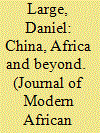

|
|
|
|
|
| Publication |
2013.
|
| Summary/Abstract |
Not so long ago, it was common to af?rm that China was the most important development in Africa's politics and international relations since the end of the Cold War. Now, after an upgrade, China is commonly held to be the most important development for Africa in the twenty-?rst century. In a relatively short period of time -Beijing's Year of Africa in ???? was also the year when China's relations with the continent acquired global visibility thanks in large part to the third Forum on China Africa Cooperation- the theme of China-Africa has been catapulted out of the mostly overlooked margins and into the conspicuous mainstream of all kinds of attention. The tour of Tanzania, South Africa and the Republic of Congo by China's President Xi Jinping in March ???? and that of US President Barack Obama to Senegal, South Africa and Tanzania some three months later stimulated more attention. It demonstrated the diverse varieties of critical and celebratory interest in media and social media coverage, as well as a growing body of China-Africa ?lms and ?ction.
|
|
|
|
|
|
|
|
|
|
|
|
|
|
|
|
| 14 |
ID:
079537
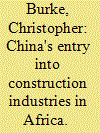

|
|
|
|
|
| Publication |
2007.
|
| Summary/Abstract |
Construction companies have played a key role as vanguards of China's engagement with Africa. China has a long history of relations with both Tanzania and Zambia, and the privatisation and deregulation of China's construction industry has been accompanied by a steady increase in the number of Chinese companies entering these two African countries. Differences in the construction industries of Tanzania and Zambia reveal interesting patterns in the participation of Chinese firms in these countries' economies. In Tanzania, the Chinese are not yet in competition with indigenous companies which lack capacity for large-scale projects. The standards of work completed by Chinese companies are considerably higher in Zambia where regulations and building codes are more strictly enforced. The Chinese have little interest in joint ventures, although they regularly subcontract local companies and procure considerable quantities of local materials and labour. Western companies maintain a decreasing advantage in specialised or technical areas of construction; however, the Chinese adapt more readily to the African environment and quickly find their feet. Once established, the only serious competition Chinese companies appear to face is from one another
|
|
|
|
|
|
|
|
|
|
|
|
|
|
|
|
| 15 |
ID:
067375
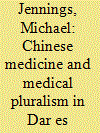

|
|
|
| 16 |
ID:
141066
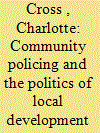

|
|
|
|
|
| Summary/Abstract |
This paper explores how the concept of ‘community policing’ has been understood and implemented in Tanzania. Whilst community policing is locally considered to be a very effective means of preventing crime and improving neighbourhood safety, the extent to which it constitutes a more accountable, responsive or ‘democratic’ form of policing, as assumed by proponents, is questionable. Based on research conducted in the city of Mwanza, this paper explains these outcomes in terms of continuities between forms of popular mobilisation that developed during Tanzania's socialist one-party era, and particularly the co-optation by the ruling party of sungusungu vigilantism, and understandings of the role of citizen participation in local development today. However, this paper suggests that as multiparty political competition becomes increasingly competitive, the sustainability of this model of community policing may be undermined, as citizens challenge the notion that they are obliged to provide resources for development directed from above.
|
|
|
|
|
|
|
|
|
|
|
|
|
|
|
|
| 17 |
ID:
097918
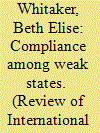

|
|
|
|
|
| Publication |
2010.
|
| Summary/Abstract |
This article examines levels of compliance with the counter-terrorism regime in Africa, where weak states might have been expected to conform. Instead, even under American pressure, some governments have seized the anti-terrorism rhetoric while others have been more reluctant. A comparative analysis of Kenya, Tanzania, and Uganda demonstrates that domestic political factors largely explain this variation; compliance is highest in countries with the least democratic institutions and minimal mobilisation of domestic constituencies. Aid dependence and the perception of a terrorist threat also play a role. To the extent that popular pressures in transitional democracies reduce compliance, the article raises questions about the legitimacy and effectiveness of the counter-terrorism regime.
|
|
|
|
|
|
|
|
|
|
|
|
|
|
|
|
| 18 |
ID:
186435
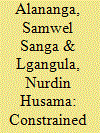

|
|
|
|
|
| Summary/Abstract |
Despite of the promising benefits of modern and clean cooking energies, its adoption has been extraordinarily low in Tanzania principally owing to preferences for Dirty and Clean Energy Mixes (DCEMs) over Clean Energy Mixes (CEMs). This study examines this energy stacking behavior based on a 2018 survey dataset of 245 useable responses from Kigamboni district in Dar es Salaam Tanzania. It is notable that the energy transition is from Single Dirty Energy (SDE) or Dirty Energy Mixes (DEMs) towards CEMs via Single Clean Energy (SCE) i.e. LPG with DCEMs in both its lower and upper sides. This approach tends to lengthen the path of transition because CEMs for cooking purposes is only affordable to the minority very high SES class. As a result the majority poor are pushed into the dirty energy “trap” despite of the booming LPG market. Although LPG support initiatives can eliminate dirty non-commercial energies, such initiatives cannot solely be relied upon to reducing the domestic consumption of dirty commercial energies even at high SES. Policy options are two way; either to alleviate SES to the level that quicken the transition or adopt wider electrification alongside appliance subsidies or microfinance to enhance CEMs affordability.
|
|
|
|
|
|
|
|
|
|
|
|
|
|
|
|
| 19 |
ID:
159552
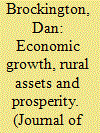

|
|
|
|
|
| Summary/Abstract |
Measures of poverty based on consumption suggest that recent economic growth in many African countries has not been inclusive, particularly in rural areas. We argue that measures of poverty using assets may provide a different picture. We present data based on recent re-surveys of Tanzanian households first visited in the early 1990s. These demonstrate a marked increase in prosperity from high levels of poverty. It does not, however, follow that these improvements derive from GDP growth. We consider the implications of this research for further explorations of the relationship between economic growth and agricultural policy in rural areas.
|
|
|
|
|
|
|
|
|
|
|
|
|
|
|
|
| 20 |
ID:
168255
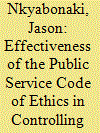

|
|
|
|
|
| Summary/Abstract |
Ethical values are core elements towards efficiency and effectiveness of the public service. Tanzania adopted the public service code of ethics as a behaviour guiding tool to public servants against maladministration practices. The study intended to measure the effectiveness of the public service ethics code as a tool to promote good governance for effective delivery of public service. The study qualitatively analysed the status of how an ethics code may control corruption in the public service. The findings from Toangoma Ward in a study conducted from June to September, 2017 revealed that the principles of a public ethos are not adhered to due to the ecology of public sector that includes, under pay, weak monitoring and evaluation of performance and the culture of nepotism in the public sector. Therefore, these weaknesses have made the public service ethos to be a myth and a failure in the management and provision of social services in Tanzania. The persistence of corruption in the service sectors has continued to ruin and damage the quality of services. The study recommends that the public sector is to be overhauled in terms of promoting best practices such as good pay, meritocracy in recruitment and promotions to higher managerial positions.
|
|
|
|
|
|
|
|
|
|
|
|
|
|
|
|
|
|
|
|
|